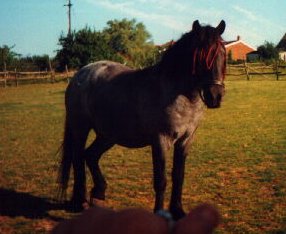

HEALTHY HORSES!
I have often sat, just wondering, how my horse passes the time when I am
not around - or how he would choose to spend his time, if it were left entirely
up to him?
Here are some clues that can help us put this knowledge to good use in
our horse management!
TIME BUDGETING
 Horses in the wild spend approximately the following amounts of time
in certain activities:
Horses in the wild spend approximately the following amounts of time
in certain activities:
60% Eating
20% Standing (incuding resting)
10% Lying down
10% Locomotion and Socialising.
Our ideal, in managing horses well, should be to try to follow the
"guidelines" provided by this natural schedule of equine "time budgeting"
as closely as we can.
FOOD FOR THOUGHT
We all know how crucial food is if we want to keep horses happy!
The horse is designed to live of his natural diet of succulent green grass.
Because the stomache of the horse is very small, it can only store a
very small amount of food at any given time. The result of this is that the
horse in the wild would spend much of his time grazing.
He takes in only little amounts of food over long periods of time to obtain
enough energy.
Because the natural diet of the horse is fresh vegetation,
it's digestive tract is adapted to digest and extract nutrients from high-
fibre food.
So when we're feeding horses, we must be aware of their
natural feeding habits and behaviour patterns.
NATURAL FEEDING HABITS
The horse's digestive system is adapted to a system of feeding Little
and Often.
For healthy functioning of the digestive tract, the horse requires plenty
of Fibre in his diet.
Fresh Green Forage provides many of the essential Vitamins and
Minerals that the horse needs to stay fit.
Eating Slowly Aids Digestion, so, time spent eating a quantity of
hay can be prolonged by feeding it in a haynet.
Concentrate meals should not be "bolted" either. The addition of chop or
chaff to feeds can help to slow down hungry horses once their heads are
in the manger.
NEXT
BACK
 Horses in the wild spend approximately the following amounts of time
in certain activities:
Horses in the wild spend approximately the following amounts of time
in certain activities: